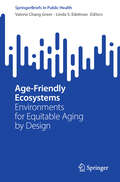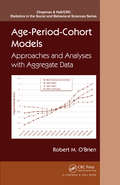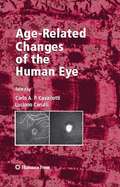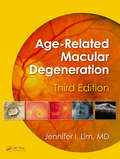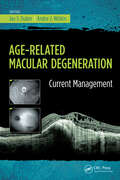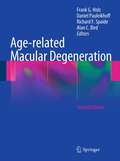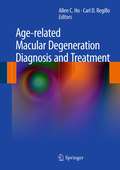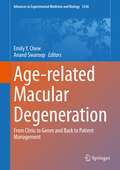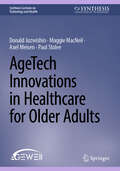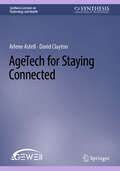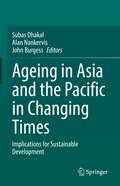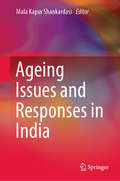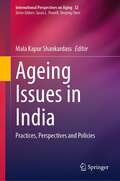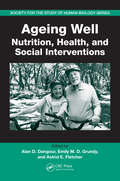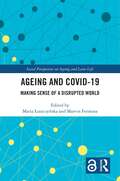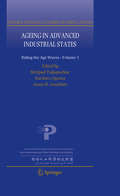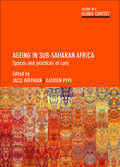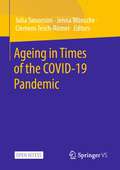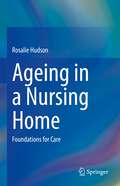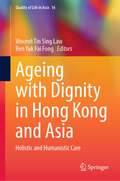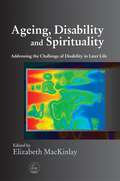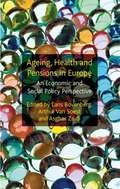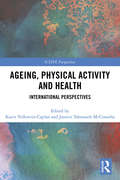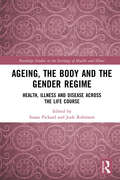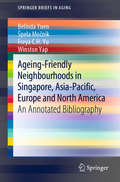- Table View
- List View
Age-Friendly Ecosystems: Environments for Equitable Aging by Design (SpringerBriefs in Public Health)
by Valerie Chang Greer Linda S. EdelmanThis compact book examines age friendliness within the framework of age-friendly ecosystems, and from a place-based approach, considering anchor institutions of neighborhoods, campuses and health environments as sites uniquely positioned to catalyze age equity and inclusivity. Age friendliness has grown from an idea into a social movement that recognizes the diversity of older adults, and integrates research, policy, programming and design practices. Compounding pressures of rapid aging, systemic ageism, and a growing disparity of resources compel us to rethink how we achieve equity in aging through the design of places and practices. Content for this book draws from a 2022 symposium, Age Friendly Communities as Platforms for Equity, Health & Wellness. Contributors build upon the content shared through the symposium in order to examine how neighborhoods, campuses and health environments are uniquely poised to support equity and to extend reach to historically marginalized populations of older adults. Ideas and experiences from national experts in aging, as well as "real world" experiences and narratives shared by older adults, students, community stakeholders and faculty researchers, are presented through a place-based approach. Collectively the voices in this book create a lens for empowering age-friendly ecosystems as environments for equitable aging by design. Among the topics covered: Creating an Age-Friendly Environment Across the Ecosystem Age Friendliness as a Framework for Equity in Aging Age-Friendly Voices in the Pursuit of an Age-Friendly Ecosystem Age-Friendly Futures: Equity by Design Age-Friendly Ecosystems: Environments for Equitable Aging by Design is written for people who are interested in understanding how the age-friendly movement is transforming places we live – community planners, designers, policy makers, aging service providers, academics and citizen activists. This compact volume presents a case of need for age friendliness in places we live, learn and care for our health. Readers with interests in the professional practice areas of aging studies/gerontology, architecture and planning, colleges and universities, community/neighborhood development, health systems, research, and policy will benefit from this brief that examines neighborhoods, campuses, and health environments from interdisciplinary perspectives.
Age-Period-Cohort Models: Approaches and Analyses with Aggregate Data (Chapman & Hall/CRC Statistics in the Social and Behavioral Sciences)
by Robert O'BrienThis book presents an introduction to the problems and strategies for modeling age, period, and cohort (APC) effects for aggregate-level data. These strategies include constrained estimation, the use of age and/or period and/or cohort characteristics, estimable functions, variance decomposition, and a new technique called the s-constraint approach. Emphasizing both the geometry and algebra of several APC approaches, the book develops readers' understanding of the statistical issues of APC analysis and shows how common methods are related to each other.
Age-Related Changes of the Human Eye (Aging Medicine)
by Carlo Cavallotti Luciano CerulliAging research on the human eyes crosses all areas of ophthalmology and also relies upon biological, morphological, physiological, and biochemical tools for its study. This book reviews all aspects of human eye aging. In addition to descriptions of age-related changes in almost all the structures of the human eyes, the authors also include interesting accounts of personal experiments and data. It provides an extensive panorama of what happens during aging in the eye.
Age-Related Macular Degeneration
by Jennifer I. LimThe value of Age-Related Macular Degeneration has stood the test of time, but progress in both basic and clinical ophthalmology has been relentless, mandating the need for an updated book. This second edition focuses on the pathophysiology and the epidemiology of age-related macular degeneration (AMD), the clinical features and management of dry an
Age-Related Macular Degeneration: Current Management
by Jay Duker Andre WitkinRetinal disease in general, and age-related macular degeneration (AMD) specifically, is of major interest worldwide due to the increasing aging population and the revolution in management of wet AMD over the past several years. Age-Related Macular Degeneration presents an up-to-date, clinically relevant monograph on the current diagnosis and management of AMD.Age-Related Macular Degeneration by Drs. Jay S. Duker and Andre J. Witkin serves as a reference for ophthalmologists treating AMD in the clinic as well as other eye care professionals who see and counsel patients with AMD. Chapters will focus on the pathogenesis and risk factors for AMD, the diagnosis of AMD, treatment options, and promising investigative interventions. To help readers gain familiarity recognizing AMD, the book contains multiple images in different formats: high quality color fundus photographs, black-and-white angiograms, black-and-white autofluorence images, and both color and black-and-white OCT images.Relevant to current management of AMD, Age-Related Macular Degeneration: Current Management concentrates on “clinical utility” rather than emphasizing published studies, filling the current void in the market for the general ophthalmology and optometry audience. Comprehensive ophthalmologists, optometrists and retinal specialists will appreciate the book’s practical approach to AMD.
Age-related Macular Degeneration
by Richard F. Spaide Alan C. Bird Daniel Pauleikhoff Frank G. HolzAge-related macular degeneration is the most common cause for the loss of central vision beyond the age of 50 in industrial nations. Triplication of the number of affected patients is expected over the next 25 years. Especially over the last years the standard of knowledge regarding etiology, risk factors, diagnostics and therapy of this retina illness has substantially grown - this will be covered in this up-to-date multi-authored work. Apart from epidemiologically and genetically identified risk factors both the various pathophysiological aspects including the role of the complement system and clinical manifestations including OCT and angiographic characteristics are clearly represented. Furthermore, the different therapeutic approaches are presented and discussed, including proven procedures such as intravitreal anti-VEGF therapy and seeing-aid systems, in addition to the latest and upcoming methods in the area of pharmacology. The volume is well-illustrated and tables and summaries complete the presentation.
Age-related Macular Degeneration Diagnosis and Treatment
by Carl D. Regillo Allen C. HoAge-Related Macular Degeneration: Diagnosis and Treatment is written by two leading experts from Wills Eye Hospital. Covering the latest therapies and treatments developed in the last few years, this is a concise yet highly illustrated and practical text that guides the clinician through diagnosis and treatment of the leading cause of blindness in older Americans.
Age-related Macular Degeneration: From Clinic to Genes and Back to Patient Management (Advances in Experimental Medicine and Biology #1256)
by Anand Swaroop Emily Y. ChewThis edited book focuses on the recent advances in our understanding of age-related macular degeneration (AMD), combining epidemiology and clinical diagnosis, with genetics and immunological aspects as well as the role of proteostasis and mitochondria before diving into new therapies including stem cell based approaches. AMD is a leading cause of largely incurable blindness worldwide and projected to double from 2.07 million to 5.44 million individuals by 2050 in the United States. Globally, 288 million individuals are projected to have AMD by 2040. The disease has enormous socioeconomic impact on the affected individuals, their families and the society. This book will bring together the state of the art basic science knowledge with clinically relevant findings and address the challenges for future research in AMD. The intersection of different disciplines will provide potential areas for further investigations to reduce the burden of blindness from AMD. This book offers an appealing and insightful resource for clinicians, scientists, students and fellows.
AgeTech Innovations in Healthcare for Older Adults (Synthesis Lectures on Technology and Health)
by Donald Juzwishin Maggie MacNeil Axel Meisen Paul StoleeThis book explores the transformative potential of digital technologies to achieve more effective and integrated health care for older adults. It examines the biological and social processes of aging through personas and scenarios, highlighting their impacts on current and future health care delivery systems. It provides a global perspective on the development of health care systems, discussing barriers and opportunities for reform and innovation within the context of policymaking and health technology assessment. Focusing on home care, rehabilitation, long-term care, and primary care, the book offers insights and tools to enhance these services for older adults. It addresses the critical adoption of standardized electronic health records, emphasizing their importance for accessibility and interoperability within health care systems. Readers are introduced to conceptual models and ethical considerations that frame the challenges and opportunities in health care. The book showcases various AgeTech innovations, pilot projects, and initiatives that can address the health care needs of older adults, improving their independence and quality of life. Additionally, it identifies key areas for future research and innovation in AgeTech, encouraging readers to engage with questions and issues that promote continuous thinking about health care reform and AgeTech integration. Targeting a diverse audience, the book aims to inspire and mobilize business leaders, educators and trainees, researchers, innovators, policymakers, health care providers, and citizens—especially older adults. By presenting evidence and practical strategies, it underscores AgeTech’s role in creating a continuous, integrated, and learning-oriented health care delivery system.
AgeTech for Staying Connected (Synthesis Lectures on Technology and Health)
by David Clayton Arlene AstellThis book is a brief introductory guide to the role AgeTech plays in staying connected in later life. It offers insight into current AgeTech research on staying connected and illustrates entry points for deploying such technologies through a range of personas and scenarios capturing the common circumstances that lead older people to become disconnected, lonely, and isolated. The book provides readers with an accessible resource for understanding what sorts of AgeTech are available, what developments have been made and are currently underway, and what evidence exists for current technologies. The rapid pace of development in AgeTech, particularly in the commercial sphere, along with the competing claims being made for the benefits of many items, makes this practical guidebook essential for researchers and developers, policymakers, service providers and caregivers, and older adults themselves. While not intended to be exhaustive, this book covers basic information on common obstacles and barriers to technology development and adoption, things to keep in mind when using technology, and making the most of what is available to support older adults in staying connected.
Ageing Asia and the Pacific in Changing Times: Implications for Sustainable Development
by John Burgess Subas Dhakal Alan NankervisThis book demonstrates that there are wide-ranging potential challenges in addressing issues associated with ageing populations in both developed and developing countries of the region. This book brings together local, national and regional perspectives on the ageing population and sustainable development nexus in selected countries in the Asia Pacific region. The countries selected in this book include a mix of developed and developing economies that all reflect strong trade, investment and migration linkages. While the Asia Pacific region is forecast to enjoy high growth in the coming decade, a recurring common policy challenge is addressing the ‘demographic time bomb’ posed by ageing populations and workforces (Montague et al., 2017). Consequently, this book focuses on strategic policies and practices of multiple stakeholders, primarily: governments, industry and education systems, together with, the range of aged care services providers – in more effectively addressing these key socio-economic challenges associated with the ageing population for sustainable development.
Ageing Issues and Responses in India
by Mala Kapur ShankardassThis book discusses emerging issues concerning ageing in India, describes the multi-layered vulnerabilities of older adults in the context of health care and caregiving, and explores social, legal and economic perspectives. It also analyses the existing policies and programmes intended to address these age-related issues and assesses the importance of preventive geriatrics towards active ageing, as well as the current scenario of institutional care for the elderly in India. Gathering fifteen chapters written by leading researchers in the fields of geriatrics, social work, anthropology, sociology, psychiatry, economics, law and mental health, the book presents the latest findings on ageing-related topics such as elderly health, family change, old age homes, age friendly environments and the role of integrative medicine. Accordingly, it offers a valuable resource for researchers, academics, practitioners and policymakers in the areas of gerontology, demography and sociology, as well as all those interested in the study of ageing populations.
Ageing Issues in India: Practices, Perspectives and Policies (International Perspectives on Aging #32)
by Mala Kapur ShankardassThis book explores various practices and policies related to ageing issues in India. It addresses ageing concerns from a theoretical and empirical viewpoint with in-depth analyses of existential dimensions of ageing. It provides deep insights into ageing in India by discussing demographics related to health and social differentials, gender concerns, retirement problems, epidemiological transition taking place in the country with rising problem of dementia and mental health problems. It consists of 23 chapters written by various established as well as upcoming scholars in the field. The authors cover a broad range of topics with regard to provisions for institutional care, geriatric practice and emerging issues of elder abuse. The book will appeal to professionals and to lay people getting interested in ageing India from a social, health, gender, economic, psychological and emotional aspects.
Ageing Well: Nutrition, Health, and Social Interventions (Society for the Study of Human Biology)
by Alan D. Dangour Astrid E. Fletcher Emily M. D. GrundyMany current public health actions and policies aimed at older people revolve around the often prevailing view that failing health is a consequence of ageing. It is now clear that it is possible to postpone or even prevent much of the age-related decline in health that was once thought inevitable. Future policies must recognise this changing paradi
Ageing and Covid-19: Making Sense of a Disrupted World (Social Perspectives on Ageing and Later Life)
by Maria ŁuszczyńskaThis volume presents a range of research approaches to the exploration of ageing during a pandemic situation. One of the first collections of its kind, it offers an array of studies employing research methodologies that lend themselves to replication in similar contexts by those seeking to understand the effects of epidemics on older people. Thematically organised, it shows how to reconcile qualitative and quantitative approaches, thus rendering them complementary, bringing together studies from around the world to offer an international perspective on ageing as it relates to an unprecedented epidemiological phenomenon. As such, it will appeal to researchers in the field of gerontology, as well as sociologists of medicine and clinicians seeking to understand the disruptive effects of the recent coronavirus outbreak on later life.
Ageing in Advanced Industrial States: Riding the Age Waves - Volume 3 (International Studies in Population #8)
by Naohiro Ogawa Anne H. Gauthier Shripad TuljapurkarPopulation growth slowed across the world in the last decades of the 20th century, changing substantially our view of the future. The 21st century is likely to see the end to world population growth and become the century of population aging, marked by low fertility and ever-increasing life expectancy. These trends have prompted many to predict a gloomy future caused by an unprecedented economic burden of population aging. In response, industrialized nations will need to implement effective social and economic policies and programs. This is the final volume in a series of three. The papers included explore many examples and strengthen the basis for effective economic and social policies by investigating the economic, social, and demographic consequences of the transformations in the structures of population and family. These consequences include changes in economic behavior, both in labor and financial markets, and with regard to saving and consumption, and intergenerational transfers of money and care.
Ageing in Sub-Saharan Africa: Spaces and Practices of Care (Ageing in a Global Context)
by Jaco Hoffman and Katrien PypeThis collection of in-depth ethnographic analysis examines the impact of local and global transformations on the care, or lack of care, older people receive in Sub-Saharan Africa. This volume provides the pan-African evidence and analysis needed to move forward debates about how to address the long term care needs of this vulnerable population. Case studies from different regions of the continent (southern, central, east and west Africa) examine formal and informal care, including inter- and intra-generational care, retirement homes, care in the context of poverty, HIV/AIDS and migration.
Ageing in Times of the COVID-19 Pandemic
by Clemens Tesch-Römer Julia Simonson Jenna WünscheThis Open Access Book contains reports on the situation of people in the second half of life during the first year of the Covid-19 pandemic. The analyses are based on the German Ageing Survey (DEAS) and they provide insights on four main areas of life: income and work, subjective health and well-being, social support and loneliness as well as societal participation.This book is useful for scientists as well as political actors by directing attention to the risk groups that have been hard hit by the pandemic while also highlighting the resilience and adaptive capacities of many people in the second half of life.
Ageing in a Nursing Home: Foundations for Care
by Rosalie HudsonSpending the final chapter of your life in a nursing home is considered, by many, a fate worse than death. Others, however, have found that through enlightened, imaginative care even the frailest of lives can flourish. The key to such a transformation is to replace the constricting custodial centres of the past with a more informed, research-based approach. This book is timely, responding to evidence of the urgent need for change described in the Australian Royal Commission into Aged Care Quality and Safety Final Report: Care, Dignity and Respect and its predecessor subtitled Neglect. In this book, the author proposes a model of care that places the whole person at its centre, sidestepping the constraints of a reductionist funding model that focusses on residents' deficits – and the proprietor’s financial gain. Aged care requires a comprehensive research-based guide to fulfil this aim. Narratives are included throughout the book to reinforce the fact that nursing home care is about individual residents and their unique lives. Topics explored in various chapters include:· Ageing in a Changing Community· Social, Gerontological Care· A Palliative Approach· Community Expectations Ageing in a Nursing Home: Foundations for Care takes a realistic approach that draws on contemporary research and narratives from the unique lives of older Australians who, despite their frailty, teach us how to care. Such knowledge informs and influences their future. The book is a resource intended for all who have a stake in the provision of best practice residential aged care, and all who benefit from such care. Its academic appeal will include those who design and teach courses in aged care: gerontology, general practice medicine, nursing, attendant care, allied health, and chaplaincy. Academics and teachers will find useful, well-referenced material for their courses, together with ample scope for researchers.
Ageing with Dignity in Hong Kong and Asia: Holistic and Humanistic Care (Quality of Life in Asia #16)
by Ben Yuk Fai Fong Vincent Tin Sing LawThis book advocates the application of holistic and humanistic approaches in elderly care and services to achieve the goal of ageing with dignity in Hong Kong and Asia. It responds to the needs of an increasing ageing population that has to deal with related health needs in long-term care, community health and social services, particularly for chronic conditions and psychosocial support. The book consists of three sections on policy and development of aged care, holistic and humanistic care for older adults, and capacity building for ageing with dignity, respectively. Topics include the latest initiatives in aged care, appropriate services and delivery models, lifestyle modification, psychosocial and environmental considerations, professional development, technologies, and social capital. The chapters review and discuss these issues within a global context, illustrated by examples from Asian countries, underpinned by locally based empirical research. Contributors include academics and practitioners from diversified professional backgrounds that include medicine, nursing, pharmacy, traditional Chinese medicine, dietetics, and allied health. The book traverses into territories in the social sciences, life sciences, and sports sciences, while also touching on areas of business and administration, hospitality, law, public policy, and information technology in connection with public health. The contents serve as a topical reference for tertiary studies in ageing and related disciplines such as well-being and are also useful to policymakers, community and public health practitioners, health executives and interns working in areas of policy and practice pertinent to care development, health delivery models, planning, quality, ethics, better health promotion, professional training, and monitoring for older adults.
Ageing, Disability and Spirituality: Addressing the Challenge of Disability in Later Life
by Elizabeth Mackinlay Christine Bryden Dagmar Ceramidas Eileen Mary Glass Matthew AnsteyThis collection examines theological and ethical issues of ageing, disability and spirituality, with an emphasis on how ageing affects people who have mental health and developmental disabilities. The book presents ways of moving towards more effective relationships between carers and older people with disabilities; ways in which to connect compassionately and beneficially with the person's spiritual dimension. The contributors highlight the importance of recognizing the personhood of all people regardless of age and of disability, whatever form it takes. They identify factors inherent in personhood and provide ways of affirming and promoting spiritual well-being for older people with disabilities. Valuable reading for practitioners in aged care, healthcare, chaplaincy, social and pastoral care, and diversional therapists, this book will also be of interest to older people, their families and friends.
Ageing, Health and Pensions in Europe
by Lans BovenbergProviding an overview of the future research challenges for economists and social scientists concerning population ageing, pensions, health and social care in Europe, this book examines how scientific research can provide cutting-edge evidence on income security and well-being of the elderly, and labour markets and older workers.
Ageing, Physical Activity and Health: International Perspectives (ICSSPE Perspectives)
by Karin Volkwein-Caplan Jasmin Tahmaseb McConathaOne of the most pressing questions facing society today is how to care for its burgeoning elderly population. By the year 2050, experts predict that one-third of the world’s population will be over 60 years old. Health promotion for the elderly is therefore becoming an increasingly important topic in public policy and planning. This book examines the challenges presented by an ageing global population, our varying expectations of healthy ageing, and the importance of exercise and physical activity for the elderly. Drawing on empirical research from around the world, it considers the factors that influence health and well-being in later life and compares practices and policies designed to promote healthy ageing. It presents case studies from 15 countries spanning Europe, North and South America, Africa and Asia, and sheds light on how attitudes to physical activity differ across nations, regions and cultures. Ageing, Physical Activity and Health: International Perspectives is important reading for all students, researchers and practitioners with an interest in physical activity, public health, exercise science or gerontology.
Ageing, the Body and the Gender Regime: Health, Illness and Disease Across the Life Course
by Susan Pickard Jude RobinsonThe current (postfeminist) gender order comprises a highly complex coexistence of old and new norms and expectations, freedom and constraints, within a neoliberal social order underpinned by individualism and involving a shift in gender performance by men and women. Health, illness and disease at different points in the life course can be used as a vehicle to illuminate structural and cultural inequalities that persist despite several decades of progressive reform in western countries. This collection brings together a number of key researchers, both established and new to the field, and based across North America, Australia, the UK and Europe, and comprises both empirical and theoretical work. Drawing on a wide range of disciplinary fields, including medical sociology, medical anthropology, nursing, gender studies, sociology of risk and age studies, all authors use heath, well-being, illness and disease as a lens through which to explore the complexities and inequalities associated with late modernity. This book will be of interest to scholars and students of age studies, medical sociology and anthropology, gender studies, healthcare and nursing.
Ageing-Friendly Neighbourhoods in Singapore, Asia-Pacific, Europe and North America: An Annotated Bibliography (SpringerBriefs in Aging)
by Belinda Yuen Špela Močnik Winston Yap Freya C.H. YuThis book brings together the emerging body of work on age-friendly neighbourhoods in Singapore, the Asia-Pacific region, Europe and North America. It begins with an overview chapter on the current state of policy, practice and research on age-friendly neighbourhoods in Singapore. This is followed by an annotated bibliography of published materials on age-friendly neighbourhoods in the above-mentioned countries and regions, encompassing theoretical work and empirical research reported on in journal articles, books and conference proceedings. The annotations for Singapore also map the grey literature, including unpublished dissertations and theses. The aim is to provide a sense of the scope of, issues in, and discourse on age-friendly neighbourhoods, the development of which is increasingly being recognised as a key strategy to support healthy ageing and enhance quality of life in ageing societies.
